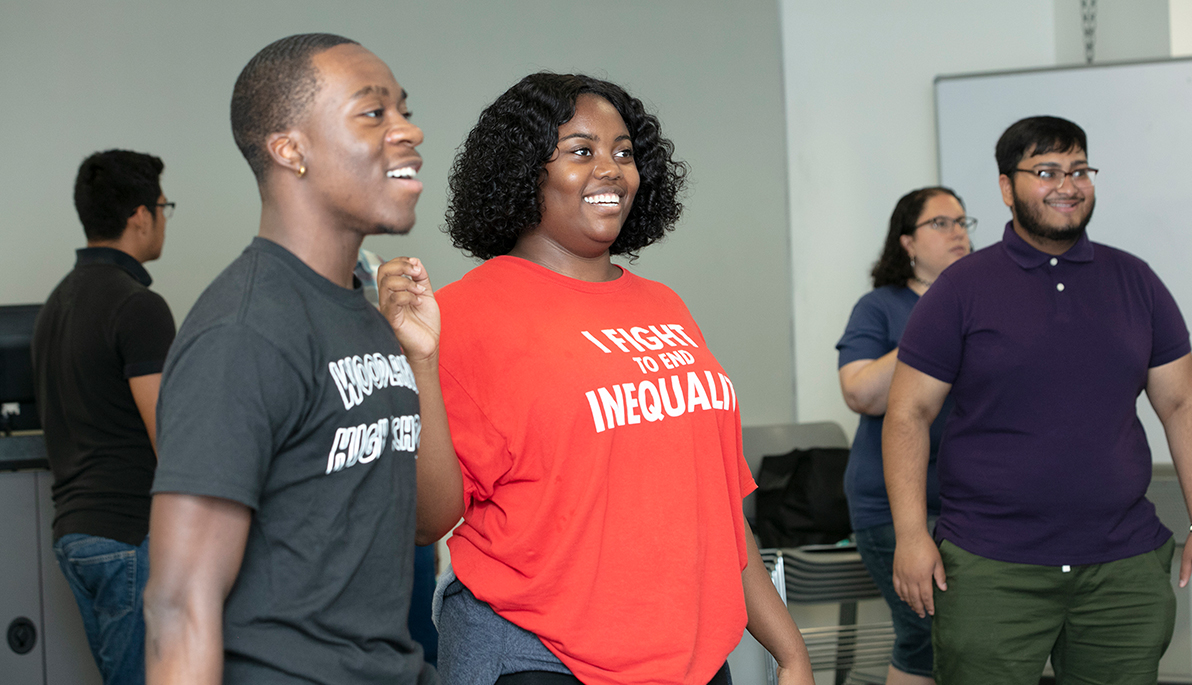
A Partnership Made for Success
February 26, 2020
Top photo: Upon acceptance into the HEOP program, students begin their academic career in a mandatory five-week program to help them ease into the academic, social, and cultural aspects of life on campus.
Since 1970, the Higher Education Opportunity Program at New York Institute of Technology has not only given disadvantaged students the chance to attend college, but has also opened the door to successful careers.
When considering college, Chaimae Benali (B.S. ’16) knew she wanted to study architecture, but not just anywhere. “I wanted to go to the best architectural program in the city, and I wanted to go to a private university,” she says. Her high school guidance counselor told her about the Higher Education Opportunity Program (HEOP), which provides financial and academic support services to New York residents who are facing challenges following their dreams to attend college.
“I’ll never forget the day he said, ‘Once you’re HEOP, you’ll always be HEOP.’ It sounded like I was joining this amazing group for life.” That prediction turned out to be true.
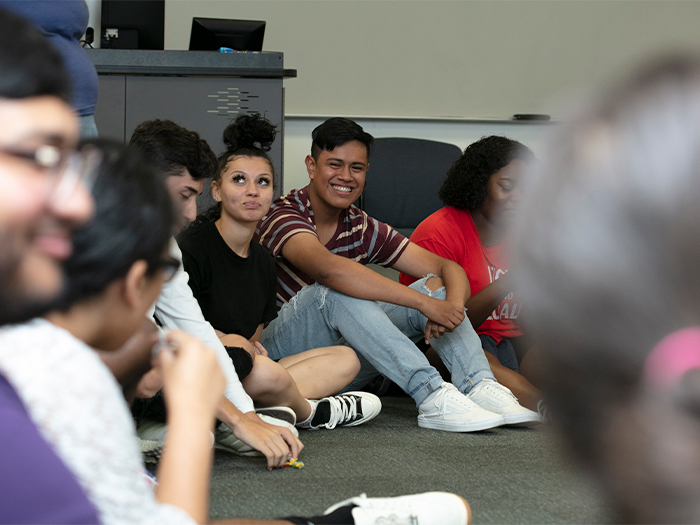
Students participate in a variety of team-building exercises, including one where they share fun facts about themselves based on the number of candies they pick out of a bowl.
The HEOP program, which allowed Benali to enroll at New York Institute of Technology, served as much more than a financial and academic resource. “At that time, my life was hard,” she recalls. “My brother was in the Army, and my mother was battling breast cancer. HEOP gave me an opportunity to go to a college I could never have afforded.” The program’s counselors helped her manage the nuances of college life while supporting her personal and professional goals. “During my mother’s passing, I decided to pursue a career in healthcare [instead of architecture]. My HEOP counselors assisted me in the transition and pushed me even harder. HEOP honestly saved my life.”
That sentiment is reiterated by Benali’s fellow HEOP alumni. Counselors and mentors, many of them former HEOP students, understand what people in the program are experiencing, including the mixture of excitement and apprehension that comes with attending an elite institution of higher education. Many HEOP recipients are the first in their families to go to college. Still others may be lacking necessary skills or financial resources. HEOP starts working with students before and during college, with the ultimate goal of graduation and employment.
For Cody Souffrant (B.S. ’15), HEOP counselors intervened quickly when they saw him struggling academically during his freshman year. “My counselors sat me down and said, ‘It’s great that you’re involved socially, but you’re on academic probation,’” he recalls. Although he initially considered studying medicine, Souffrant’s HEOP counselors helped him search for something he was passionate about. “I realized I really wanted to pursue social work,” he says. With the help of HEOP, he shifted course, got his grades up, and graduated with a B.S. in behavioral science with a concentration in sociology/social work.
Today, Souffrant is a HEOP counselor at Fordham University. He enjoys giving students there the same level of attention he received while an undergrad. What’s more, he was able to obtain his Master of Social Work at Fordham as he helped HEOP students there. “None of this would have been possible if it weren’t for New York Institute of Technology’s HEOP,” he says.
HEOP at New York Tech
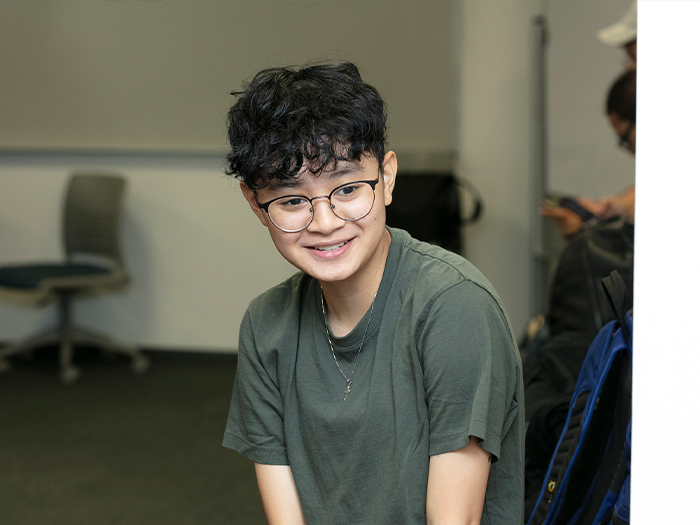
HEOP provides financial and academic support services to New York residents who are facing challenges following their dreams to attend college.
A Multifaceted Program in New York State
The New York State legislature established HEOP in 1969 at independent colleges and universities. In 2006, the program was named in honor of former New York Assemblyman Arthur O. Eve for his efforts to increase access to higher education across the state. What makes HEOP unique is its multifaceted approach to getting students into college and helping them thrive in school and beyond. In addition to financial aid, HEOP offers academic, financial, and career counseling; one-on-one and small-group tutoring; and remedial and developmental resources.
To qualify for HEOP, a student must be a resident of New York for at least one year prior to entry in an undergraduate program, be educationally disadvantaged (meaning a student who wouldn’t otherwise be accepted into a school of higher education), have the potential and motivation for successful completion of college, and be economically disadvantaged. For example, a student may have scored very low on the SAT or ACT but has a strong desire to attend college. Once admitted, maintaining a certain GPA is vital to remain in the program.
HEOP has had a tradition of success at the New York City campus since it started there in 1970. “It’s the only program of its kind at New York Institute of Technology,” says Phillip Menzies, director of the university’s HEOP. “Each year, we review over 500 applications, and we try to accept about 20 students. We look for students with signs of academic promise. Our agenda is to take them and equip them with the tools and skills they need to thrive.”
Upon acceptance, students begin their academic career in a mandatory five-week summer program that is part of the HEOP curriculum. It eases students into the academic, social, and cultural aspects of life on campus, with four days of college-level writing and math classes each week and a fifth day focused on cultural enrichment. “For instance, we’ve done team building in Central Park and community service projects,” Menzies says. “We want to get them immersed in the community.”
The summer program also gives students advice on study skills and activities to help them manage their academics once the fall semester starts. “We also have a group activity where we look at what to do in particular situations,” Menzies says. “We do this via role-playing. Their peers are sort of like a judge and jury.” While these activities aim to prepare them for four years of college, they also serve as relationship-building events. “The HEOP students go through this process together, and they form bonds,” Menzies says. “They come back to campus in the fall and reconnect. They know their way around campus and the city.
“Then in the fall, we offer one-on-one counseling every week,” Menzies says. “Students are assigned to a HEOP counselor for four or five years” who checks in regularly on their academics as well as their social and emotional well-being.
One of the biggest roles of the HEOP staff is to cast safety nets when necessary. Being able to rely on counselors during a family crisis gave Bryan Diaz (B.S. ’18) the security he needed to stay in school. “In the middle of my college career, my mother had lost her job, and that was a weight we all had to carry,” he says. “With the help of my HEOP counselors, I made sure my financial documents were up-to-date so that the aid I had been receiving remained intact.”
An Unbreakable Bond
Counselors within HEOP go the extra mile to ensure students achieve their goals. “Everyone on the HEOP team puts their heart into it,” Souffrant says. “They change lives every day just by being their authentic selves. They knew my dreams and my goals. They made sure I graduated and had a path.”
While getting a degree is always part of the goal, Menzies notes that looking beyond graduation is key. “You don’t have to go to college to get a job, but you do need to go to college to have a career,” he says. “For a lot of the students in HEOP, it’s about helping their families, but you can’t do that if you’re making peanuts.
“We have students who have studied engineering, architecture, reflexology. Some work in higher education. Through their experiences here, they have a sense of how to network, who to talk to. That’s crucial to make themselves marketable in the real world.”
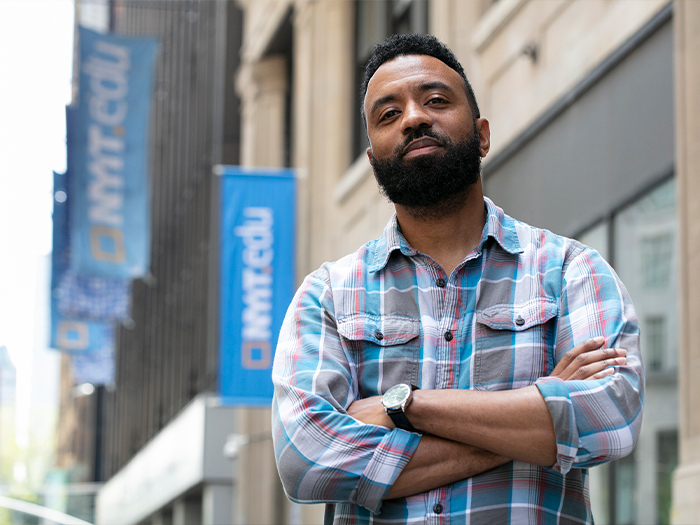
HEOP Director Phillip Menzies
Getting involved inspires HEOP students to be leaders after they graduate. “I got involved in student activities on campus which led to co-founding a student organization called SWAG, Students Working to Achieve Greatness,” Benali says. “I was able to make a difference in students’ lives. A special project that SWAG and HEOP teamed up on was Breast Cancer Pink Day in memory of my mother and everyone battling breast cancer. During a time of grief, HEOP helped me stay strong and push forward.”
As an administrative clinical manager of two Joseph P. Addabbo Family Health Centers in New York City, she uses the leadership skills and positive experiences from her time at New York Tech. “Each day, I am fortunate enough to serve my patients and the community,” she says.
Paying It Forward
One of the most remarkable aspects of HEOP is its commitment to assist others in the program. “As a former HEOP student myself, I know there was always someone reaching back to help,” Menzies says. “We pay it forward. That’s our motto. It’s important that we’re carrying on that legacy.”
Jairo Abreu (D.P.T. ’08), a HEOP alumnus who earned a Bachelor of Science and a Doctor in Physical Therapy, enjoys connecting with current HEOP students. “I found out about HEOP when I was in high school. I got good grades, but I came from a low-income family,” he says. “My HEOP advisors held me accountable. They helped me find my passion. I have gone back many times to show students where someone who was once in their position is now.”
You don’t have to go to college to get a job, but you do need to go to college to have a career.
Phillip Menzies, Director of HEOP
Zikomo Barr (B.S. ’15) also returns to campus whenever possible. He has built his entire postcollege career around leadership, facilitating development workshops, presenting at business conferences, and serving as a master of ceremonies for large-scale events. His dedication has earned him the Alpha Phi Beta Brother of the Year award and recognition from the National Society of Leadership and Success. During annual panel discussions at New York Tech, Barr shares his professional experiences and links them to the guidance offered by HEOP.
Networking remains a key component of the HEOP experience. Through the bonds he created at HEOP, Souffrant became aware of the counselor position at Fordham. “I am thankful for people getting me to that next step,” he says. In his role there, Souffrant draws upon his experiences as a former HEOP student. “The students often ask me, ‘Were you HEOP?’ When I tell them I successfully went through the program, it brings joy to their eyes,” he says. “They see if I could do it, they can do it, too.”
Souffrant relishes the opportunity to follow the HEOP tradition of paying it forward. When Hunter College was looking for a chemistry tutor, Souffrant recommended a HEOP student at Fordham who was about to begin his Ph.D. “He was able to create lesson plans and get a lot of experience before he went back to school,” Souffrant says. “Who knew this guy would graduate at the top of his class and go on to study for his Ph.D.? It’s really powerful when you’re able to help other people. “It’s like no other department on campus,” Souffrant says of HEOP. “You get the chance to prep students for college, for life.”
A Unique Perspective
The students who are part of HEOP also add to the diversity of the New York City campus, Menzies says. “This university strives to be inclusive, and HEOP adds to the whole concept. Each student has a different story, and that determines what they bring to the table and what they contribute on campus.”
The chance to attend college in New York City melds with the opportunity to add a different perspective to the experience, and that is one of the most enduring legacies of HEOP. “They are not isolated students,” Menzies says. “They are New York Tech students first and foremost, but they bring their unique backgrounds. Together, they learn and grow as a community.”
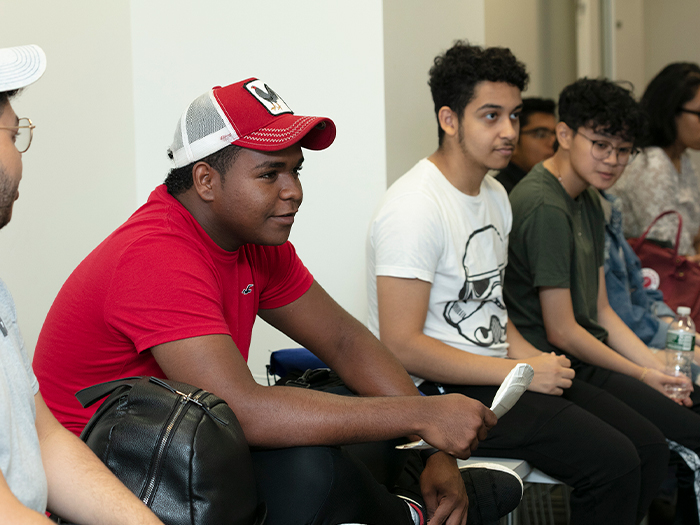
Incoming freshmen get to know each other during group storytelling exercises.
Souffrant knows how much HEOP makes a difference in the lives of participants and the people around them. “Who would think that a kid like me from Long Island, bordering on Queens, would find the courage to move to the heart of the city and go to college?” he wonders. “New York Institute of Technology and HEOP were the greatest things to ever happen to me.”
This article originally appeared in the Fall 2019 issue of New York Institute of Technology Magazine
More Features

An Alumnus’ Commitment to the Environment
As an energy management graduate from New York Tech’s Vancouver campus, Jasdeep Gulati (M.S. ’22) is highly invested in educating people about environmental and climate sustainability.

Vancouver Faculty Win University-Sponsored Research Awards in New Program
The new Global Impact Research Grant (GIRG) program has been developed to keep Vancouver-based faculty connected to faculty and research projects being conducted on the university’s New York campuses.

Studying Climate Change One Degree at a Time
Junhua Qu (M.S. ’24) began her collegiate journey in Beijing. But, her interest in climate change took her to New York Tech’s Vancouver campus to study energy management.
